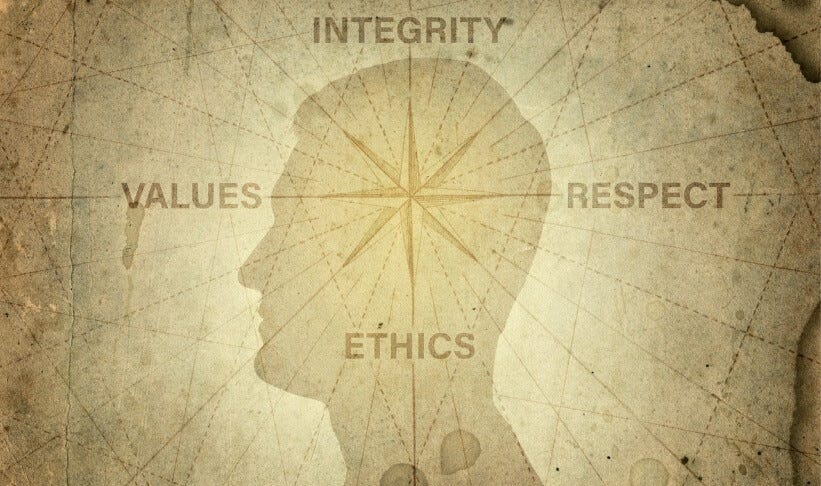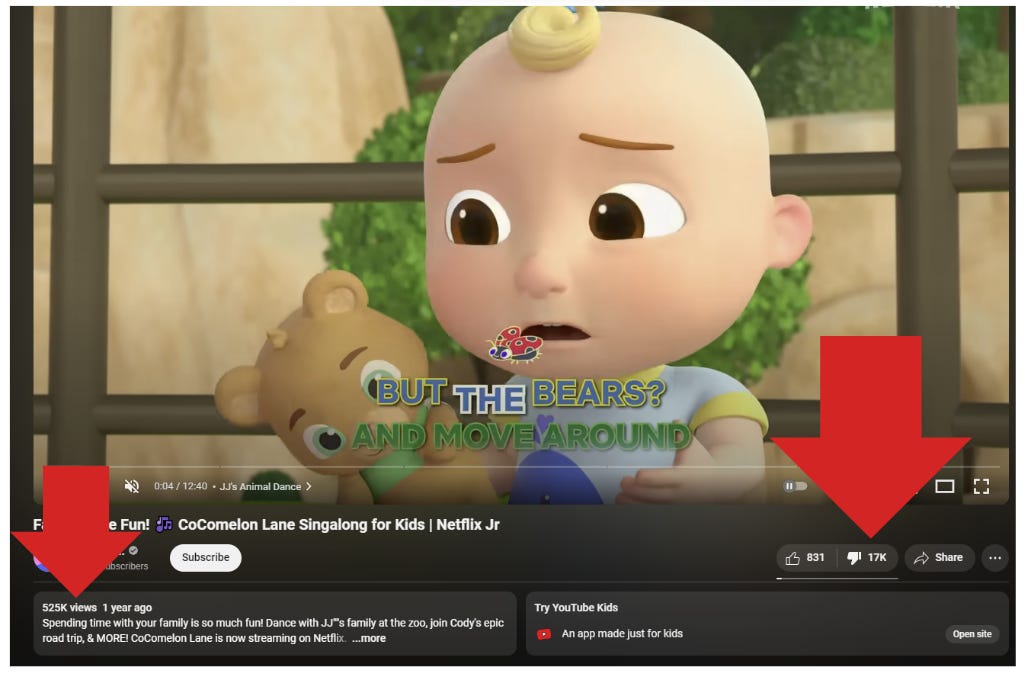Cocomelon's History and Controversy, Explained
Once a family-run venture, Cocomelon is now a global giant—but their global success may come at a steep cost.
Admin note: This is my 100th post! Thank you for the reads, likes, and shares!
Watch or listen to this post: Rumble | YouTube.
For us 80s and 90s kids, TV was relatively limited in terms of technology and content.
There were only a handful of channels to choose from, people only stared at the phone when anxiously expecting a call, and nobody batted an eye when Mr. Rogers said boys could never be girls.
But Cocomelon, perhaps the most popular and most profitable children’s shows of all time, has also become one of the most controversial.
While some say critics of the show are just being uptight, the key to understanding the argument may lie in the show’s evolution.
Where did it come from? What did its creators intend? And is it really turning our kids into mindless NPCs?
Let's see what’s making the wheels on this controversy go round and round.
History

Parental inventions such as the Wubbanub, a stuffed animal with a detachable pacifier, the SnoozeShade, a fully enclosed stroller, and the Veer Cruiser, a children’s utility cart, were designed not by suits in ivory towers but by parents in the field.
But John Jeon had a unique idea when he and his wife began creating short 2D animations in 2005 to entertain their two children.
In 2006, they launched their YouTube channel ABCKidTV to share their creation with kids worldwide.

Eventually, as the views, likes, and shares increased, the ad revenue reached a point that allowed the couple to quit their jobs and focus on production full-time.
In 2013, the Jeons began re-releasing 3D modified versions of older clips, and fans saw the early representations of the characters we recognize today.
After a few years, the team needed a shorter and catchier name, something that kids could remember and easily pronounce. They settled on Cocomelon.
As success persisted, Moonbug Entertainment, a British content firm, acquired Jeon’s company, Treasure Studio, in 2021 for an undisclosed amount.
In 2021, Candle Media, founded by two former Disney executives, purchased Moonbug with backing from Blackstone (no, not Blackrock), a New York private equity firm that owns everything from Bumble, the popular dating app, to Hilton Hotels to the Aria resort in Las Vegas.
By 2022, Cocomelon aired regularly on Netflix and dominated the YouTube Kid's scene with 186 million subscribers and over 192 billion views today.
But despite the popularity and success, many believe something sinister lurks beneath the surface.
Addiction

Parents know Cocomelon is a great way to keep kids quiet when you need to get stuff done.
But does it work a little too well? Parents worldwide have cited cases of the catchy sing-alongs seemingly hypnotizing their children. Look at these kids reacting to the opening tune:
When it is time to turn off the TV or take away the tablet, the house turns into an episode of A&E’s Intervention. Why?
The reason for this may lie in big data.
Back in the pre-streaming days, TV producers collected feedback from focus groups and Nielsen Boxes, small devices that volunteers known as Nielsen families installed in their homes to report viewer data.
With this limited audience information, creators sought to balance entertainment and education to keep parents and viewers happy.
But in the streaming era, feedback appears instantly on creator dashboards, not from select families but from all viewers via likes, shares, subscriptions, and views. They know not only what episodes are the most popular but which parts of each episode.
With so much information, analysts can maximize profits by manipulating viewer behavior.
The Science

Moonbug still uses focus groups and in-person interviews to gain feedback. But they take it a step further with a “Distractatron.”
Here is how it works: Participants watch an episode as usual, but next to the main monitor, a secondary screen plays mundane footage, such as someone watering the lawn or getting their haircut.
When a child glances at the Distractatron, an analyst makes a note.
To reduce wandering eyeballs, they increase rapid scene cutting, a film editing technique typically designed to depict chaos, anxiety, or a sense of urgency. Here’s an example from the 2000 film Requiem for a Dream.
These quick visual shifts release dopamine, making it difficult for kids to turn away.
Let’s compare cuts between Cocomelon and a much more chilled-out program called Puffin Rock.
Cocomelons' color scheme also plays a role. By maximizing color saturation levels, such as reds, greens, and yellows, each scene becomes more appealing to the eye. App and web developers do the same thing for alerts and notifications.
The sing-alongs also contribute to the mesmerization. While word repetition might be good for recognition, the rhythm helps hold the viewer's attention.
Finally, one might assume the subtitles are intended to help kids learn to read. But this show is designed for children ages 1 to 3. The average child doesn’t learn to read until age 6 or 7.
The bouncing letters and numbers are nothing but more moving objects to retain focus.
DEI

Addictiveness aside, parents today also have concerns about the politics that appear in Cocomelon scripts.
TomTom and friends found themselves in hot water in 2023 after releasing the “Just Be You” episode, featuring a male toddler dancing in a tutu for a gay interracial couple.
Again, this show is for 1-3 year olds.
Moms and Dads worldwide clearly didn’t approve, with many claiming to have canceled their Netflix accounts and outright banned the show from their households. I’m one of them.
But they apparently took it down and re-uploaded it, as the video now shows as released in June of 2024-but the questionable scene remains, as do the 17k dislikes.
I also didn’t care for creators constantly portraying the white dad as the effeminate, hapless husband. I’ve got a whole post on the idiot dad trope here if you’re interested.
Aside from that, I think the general wokeness is a turn-off, with spinoffs like It’s Cody Time and Nina’s Familia.
It’s not that I only want to see white people. It’s just that I don’t think producers include “progressive” content because they believe in diversity. They just know they must follow the political agenda if they want to stay in the good graces of the powers that be.
Where’s the Line?

How does Cocomelons evolution explain the program’s controversy?
I think the farther JJ and the gang drifted from their initial intentions and creators, the worse it became for viewers’ mental health.
I’m happy for Jeon’s success as it illustrates the American Dream. After legally immigrating from North Korea and claiming asylum in the US, they started a business and became wildly successful. This explains why there’s hardly any public information about them. I’ve got a post on that as well:
But as those in control became more faceless and global, Cocomelon became less about wholesome educational entertainment and more about making as much money as possible, regardless of the consequences.
For many kids, those consequences include delayed speech and behavioral issues. By breaking program engagement down to a science, they removed the storylines and messages that the shows I grew up on portrayed.
The show has been reduced to bright colors, repetition, and rapid movement. The whole thing is straight out of Black Mirror.
Sure, billion-dollar companies pretty much own all children’s content, but everything is relative.
Cartoon Saloon, Dog Ears Media, and Penguin Random House co-own Puffin Rock, collectively worth about 5 billion.
9 Story Media Group owns Daniel Tiger’s Neighborhood, worth about 71 million, and Mattel Television owns Fireman Sam, clocking about 6 billion.
Blackstone, Cocomelons’ current parent company, is worth more than all those brands combined at $138 billion, roughly the equivalent of Hungary’s GDP.
I don’t know if there’s a financial line, but there’s certainly a moral one, and many of us feel Cocomelon and its World Economic Forum-associated owners crossed it.
When we say Cocomelon is brainwashing our kids, we don’t mean in the AC/DC spinning records backward kind of way. They are just pulling levers to maximize profits. If your kids end up with behavioral or learning issues as a consequence, they won’t lose any sleep.
Cocomelon’s sing-a-longs might offer silence in the present. Just be aware that even though it might be free to watch, it might cost your kid dearly.







